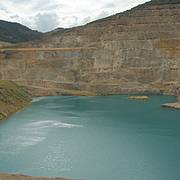What limits the scaling-up of sustainable practice in business?
27 June 2012 | News story
We understand more than ever before about our connection with the natural world. The private sector depends on the environment in a multitude of ways, yet businesses continue to degrade natural resources through their unsustainable actions. The business case for sustainability is strengthening and exemplary businesses are committing to changing their ways – but why is sustainable practice the exception and not the rule? What do you think the barriers and solutions are? You are invited to share your views on this important topic by participating in our short survey. Your views will help inform a key workshop seeking solutions on this topic at the IUCN World Conservation Congress in Jeju, Republic of Korea in September, 2012.
The private sector depends on biodiversity and ecosystem services (BES) to do business, although this is not always acknowledged. At the same time, the sector impacts the natural environment in ways that are not often quantified or valued. It was estimated in 2008 that the cost of environmental damage by the world’s 3,000 largest publicly-listed companies was US$ 2.15 trillion1.
These dependencies and impacts on BES create risks for businesses, and there is an increasingly clear ‘business case’ for sustainable action – to sustain sources of natural inputs like clean water; to sustain productive environments; to avoid costs and delays associated with non-compliance with environmental regulations; to prevent environmental disasters and reputational damage linked to unpreparedness and dirty business. By taking action, businesses can minimise financial, reputational and operational risks and make sustainable management a competitive advantage.
Businesses face increasing pressure from investors, conservation organisations and society to sustainably manage BES. A number of solutions exist to bring about change. International regulations are forcing companies to clean up their act. Certification schemes are empowering the public as informed consumers to demand sustainably produced goods. Investors who are increasingly aware of the importance of BES are making use of benchmarking tools to help direct them towards companies that are acting sustainably as highlighted in the latest Natural Value Initiative report Tread Lightly.
A number of businesses have already stepped forward and committed to minimising their dependence and impacts. Leaders are emerging across different sectors. In the extractive sector, where damage to ecosystems is inevitable, leaders have committed to offsetting unavoidable impacts through positive actions elsewhere.
Progress is being made, but business on the whole remains unsustainable. If there is such a strong business case, why is sustainable practice the exception and not the rule? What is preventing the scaling up of sustainability to more sites, more businesses and operations and across the entire supply chain? Why are the available solutions not catching on?
These important questions will be the subject of a workshop organised by Rainforest Alliance along with IUCN, Nespresso, Earthwatch Institute and Fauna & Flora International as part of the IUCN World Conservation Congress in Jeju, Republic of Korea in September, 2012. Sharing your views on this important topic by participating in our short survey will help inform the event and we will make the results publically available.
1PRI. 2010. Universal ownership: why environmental externalities matter to institutional investors. PRI Association and UNEP Finance Initiative.



